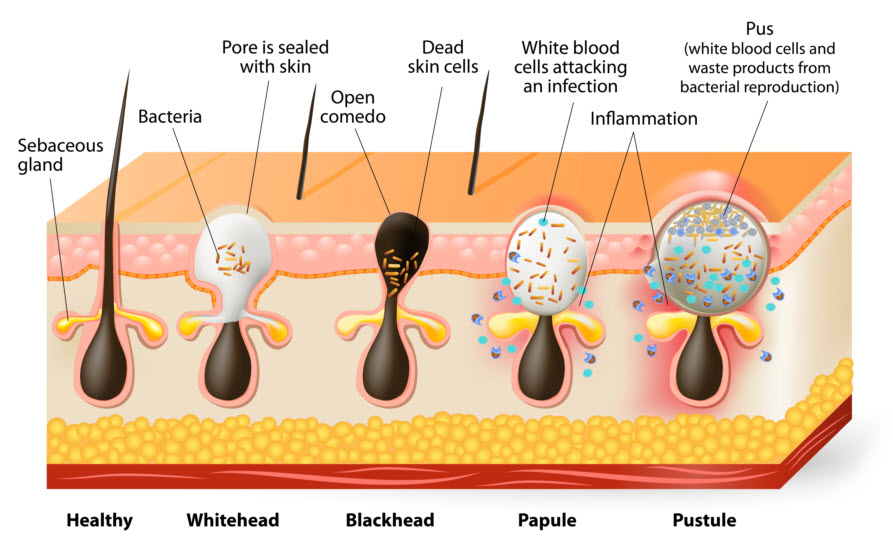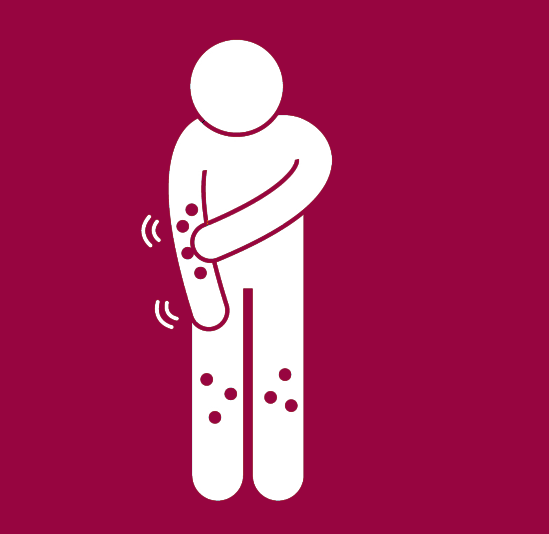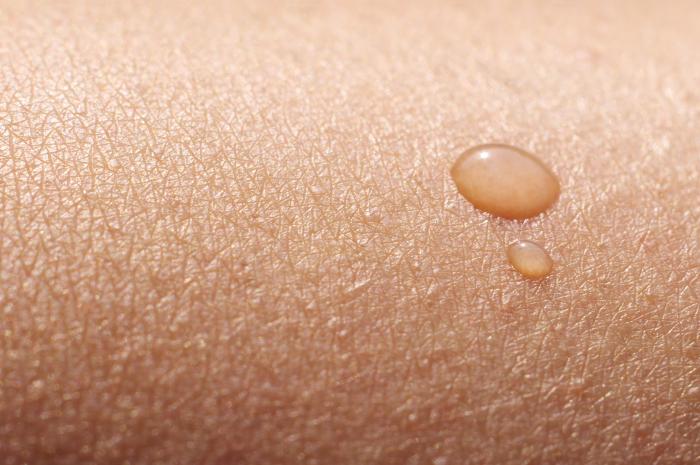You are here
Acne, oily skin and persistent spots
Acne is a common inflammatory skin disorder characterized by pimples, blackheads and whiteheads.
It usually develops when the sebaceous glands and the lining of the hair follicle begin to work overtime, often due to over-production of male hormones, or androgens.
What is acne ?
Normally, the lining of the hair follicle sheds old cells that are then carried to the surface of the skin by the sebum - an oily substance secreted by the sebaceous glands that helps prevent hair and skin from drying out. When the follicle is overworked and clogged, cells and sebum accumulate, forming a plug.
Acne usually affects everyone on the face. 50% of people affected have acne on their back and 15% on the chest.
Acne causes spots and oily skin, and sometimes your skin becomes hot and painful to touch
What are the symptoms of acne ?
It is most common on the face, but half of people with acne have it on their back. A smaller percentage of people (about 15%) get acne on their chest
The spots normally associated with acne are blackheads, whiteheads, papules (small tender red bumps), pustules – like papules, but with a white tip), nodules – sometimes painful large hard lumps beneath the surface of the skin and cysts, large pus-filled lumps.
Acne usually affects everyone on the face. 50% of people affected have acne on their back and 15% on the chest.

Why do I have acne (and oily skin)?
Normally, the lining of the hair follicle sheds old cells that are then carried to the surface of the skin by the sebum - an oily substance secreted by the sebaceous glands that helps prevent hair and skin from drying out. When the follicle is overworked and clogged, cells and sebum accumulate, forming a plug.
The most common acne is the type that develops during the teen years. Puberty causes hormone levels to rise, especially testosterone. These cause skin glands to start making more sebum, which mixes with dead cells and clogs the skin's pores. Bacteria can grow in this mixture. And if this mixture leaks into nearby tissues, it causes swelling, redness, and pus.
Does acne affect men and women the same way?
Women typically experience more adult hormonal acne than men because of their monthly periods. However, men may also experience hormonal acne. Spikes in testosterone are the likely cause and can be triggered by poor diet, too much protein and certain medications, along with food sensitivities to dairy, gluten, sugar and soy.
Underlying health problems can also cause acne. These include candida, thyroid problems, PCOS, diabetes, digestive imbalances and metabolism issues.
How can Foodwise help? 
Is acne an issue for you? Foodwise can help.
Anti-inflammatory medications and topical creams are not your only options.
We have all the nutritional information and dietary advice to help you get rid of acne and prevent it reoccurring.
Join nowHow does healthy nutrition help treat acne naturally?
The claim that acne and nutrition are unrelated is just a myth that many people still hold on to, including many dermatologists.
Acne has many contributing factors and each case is unique, but you can greatly improve your chances of clear skin with simple changes to your food choices and lifestyle.
Since male hormones (androgens) directly increase the activity of the sebaceous glands and causing them to produce more oil (sebum), it is important to focus on ways to lower circulating androgens. One way to do this is through a lower fat, higher fibre diet, as consuming a lot of animal foods and saturated fats tend to promote androgen release.
Low levels of vitamin C and E, zinc, selenium, and carotenoids may also contribute to acne. These nutrients help fight free radicals that break down skin elastin, produce collagen, and repair skin damage. Preventing acne and oily skin should focus on eating whole food foods, avoiding acne triggers, identifying food sensitivities, improving digestive health and consuming plenty of fluids, as well as the appropriate use of natural supplements and home remedies.

